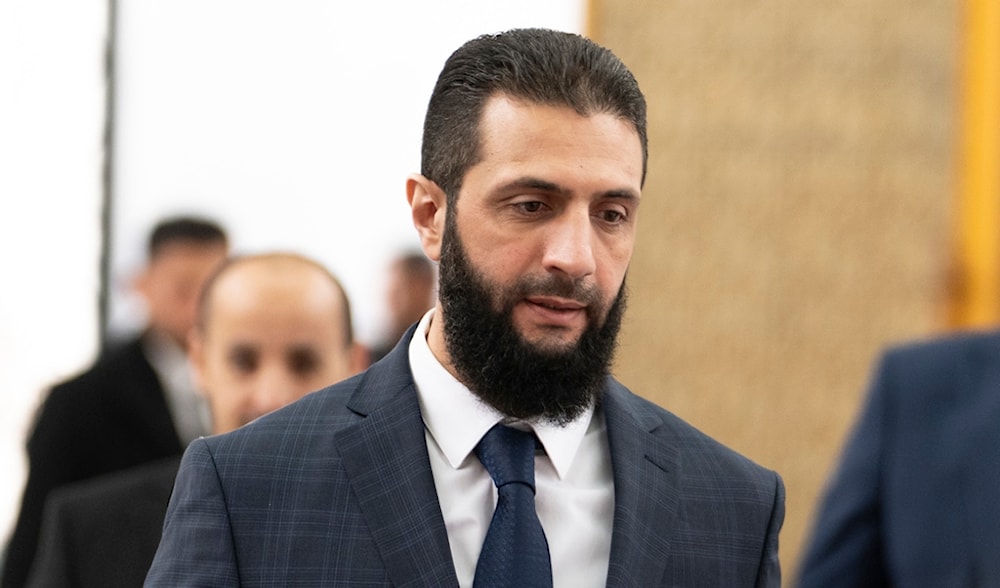Priority is Syrian unity, strong economy: Al-Sharaa to The Economist
Syria's Ahmad al-Sharaa discusses his vision for the nation, economic sanctions, and the governing system in Syria in an interview for The Economist.
-

Ahmad al-Sharaa walks in the presidential palace ahead of his meeting with Walid Ellafi, Libyan minister of state for communication and political affairs, in Damascus, December 28, 2024. (AP)
Rebuilding a Syrian state on new and modern foundations is the top priority for the next phase of five years, Syria's Interim President Ahmad al-Sharaaocr said in an exclusive interview for The Economist.
"The next phase of five years will revolve around rebuilding the state on new and modern foundations. It is going to promote justice and counseling, and it is going to be based on the participation of all segments of society," al-Sharaa told The Economist.
The interview, held in Damascus, explored al-Sharaa's vision for Syria, the current administration's endeavors toward achieving stability, and future plans and expectations for the nation.
According to the interim president, Syria encompasses an abundance of issues that need to be resolved through rapid, serious, and efficient measures, particularly unifying the Syrian people, strengthening the economy, and enforcing arms control.
Speaking about international relations, al-Sharaa highlighted recent efforts to restore Syria's bilateral ties with regional and international countries. In this context, he emphasized that the "two most important things" that aggravate Syrians' suffering are US sanctions, "which are killing people," and the Israeli incursion into Syrian territories. "The Israelis need to retreat because their advancement will cause a lot of trouble in the future," he said.
The government, elections, and legal system
Regarding the current mechanism for the governing authority in Syria, al-Sharaa stated that international custom allows the force that secures victory in a revolution to have the right to choose the presidency. In this case, the forces that achieved victory were military forces, which he asserts to be in harmony with. However, he emphasized that the country would not be governed by the military.
He added that one of the most significant challenges was ensuring that weapons remained under state control. Achieving this through consensus is a positive step, al-Sharaa maintained, reassuring the Syrian people that the armed factions voluntarily agreed on the country's leadership without major conflicts.
Regarding the expected date for holding free and fair elections in Syria, the head of the transitional phase stated that elections require a population census, the return of refugees, the reopening of embassies, and the restoration of legal connections with the people. This process, he added, "takes time. I consulted experts, and they estimated that it would take at least three to four years to complete," while law developments are simultaneously underway.
When asked whether Syria would become a democracy, al-Sharaa responded, "If democracy means that the people decide who will rule them and who represents them in the parliament, then yes Syria is going in this direction."
When asked by The Economist about the legal system in Syria, particularly whether the administration is opting for the Civil Code or Shariah law, al-Sharaa explained that any law changes, which will eventually be established, would have to be reviewed and approved by an interim parliamentary assembly. Therefore, the general legal system Syria will be governed under would have to be chosen by field experts,
"If they approve it, my role is to enforce it; and if they do not approve it, my role is to enforce their decision, as well," he said.
Consequently, al-Sharaa affirmed that federalism would not overtake Syria, asserting that the Syrian Democratic Forces, which hold significant power in northern Syria, have agreed to join and cooperate with the state.
The economy, US sanctions, and Israeli violations
On the economic front, al-Sharaa stated, "Syria has a huge opportunity for investment, and [Gulf] countries can, through their sovereign funds, make wide investments." According to the Syrian leader, the country aims to build its economy through investments rather than depending on relief aid, which could consequently manifest chaos.
Meanwhile, regarding sanctions, he announced that Syria aims to restore diplomatic relations with the US. "If that happens, we will submit our objection to the continuation of the sanctions, and I believe that President Trump seeks peace in the area, and it is a top priority to lift the sanctions," he said, emphasizing that the new relationship should be established with Syria, not Hay'at Tahrir al-Sham.
Responding to a question about the presence of US forces on Syrian territory, al-Sharaa said illegitimate military presence must end unless an agreement is reached with the sovereign state; a condition absent with the United States.
In this context, he said Syria has been reassessing the Russian military presence. "We may reach an agreement with them, or we may not, but one way or another, any military presence must have the approval of the host state."
Regarding the Israeli occupation's breach of the buffer zone, al-Sharaa reiterated Syria's commitment to the 1974 agreement and its readiness to receive the UN force stationed in the buffer zone. "A direct communication took place with the UNDOF, and they expressed their readiness to enter the buffer zone, but the Israeli forces should retreat to the borders where they used to be before the latest advancement so that the UNDOF can enter the area."
Read more: 'Israel' builds bases in Syria, sparking fear of occupation: WashPo

 5 Min Read
5 Min Read








